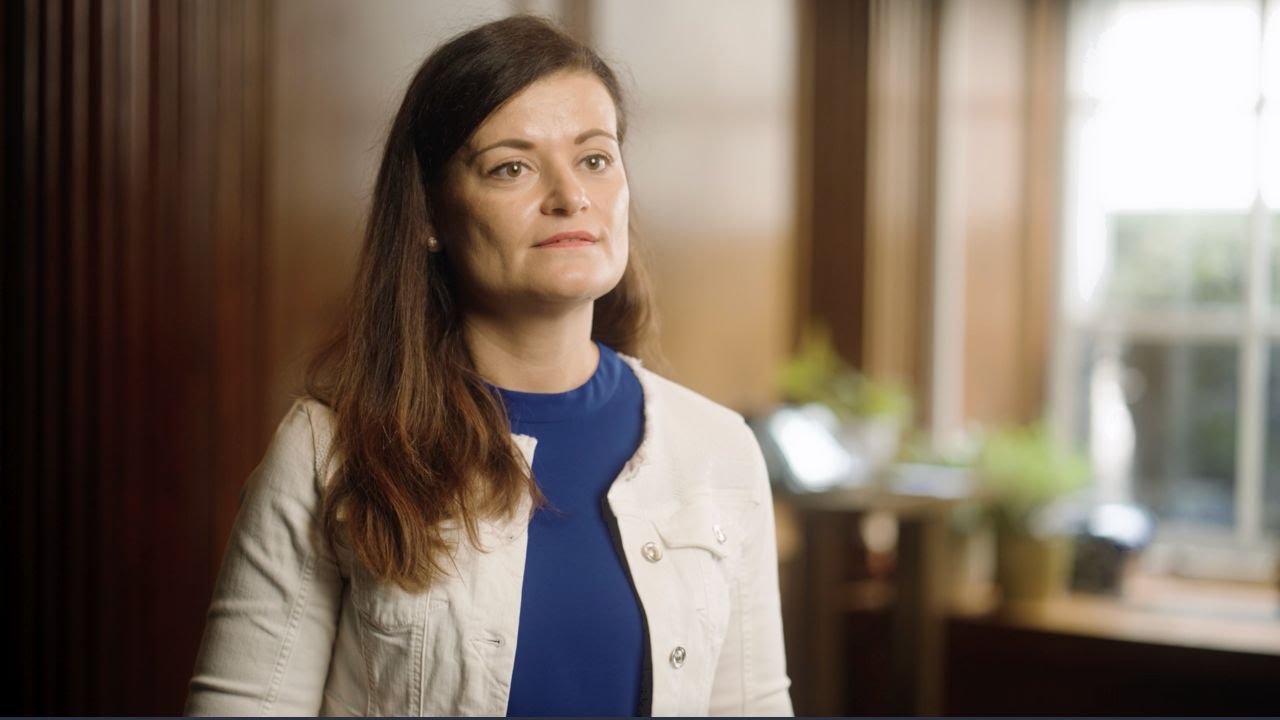- New ways of thinking and working at all levels of the organization aren’t just necessary — they’re critical to successfully adopting AI-native talent intelligence.
- Executive and management buy-in is a must when it comes to building a talent strategy and talent marketplace.
- Defining your org’s problems and desired outcomes is the first step in launching an effective skills-based strategy.
As co-host of The New Talent Code podcast, Jason Cerrato, VP, Talent-centered Transformation at Eightfold, is often recognized for his voice. Unsurprisingly, he also has a knack for words. Especially for setting the stage in how AI can help HR leaders achieve their goals and support their business.
When he kicked off a panel discussion at Cultivate Europe 2024 with talent leaders from Mars, MM Group, and Ubisoft, Cerrato described three vital pieces of a well-crafted talent strategy with this punchy alliteration:
- First, there’s the product — the technology or system that HR uses to curate talent data at scale.
- Then, there’s the process — how can the organization promote adoption and make the tool truly useful to everyone: HR, employees, management, and leadership?
- And finally, but perhaps most crucially, there’s defining the problem — what are we using this technology to solve? What is the “why” driving our implementation of this new product and process?
With these “three P’s” in mind, these industry-leading talent professionals shared how they’re using AI-native talent intelligence to rethink and reshape talent strategies, especially when elevating the employee experience and helping managers work more efficiently.
Read on for the highlights from this Cultivate EU panel featuring Eva Edelmueller, MM Group Head of Group Talent Attraction and Talent Management; Gemma Konrad, Mars
Career and Performance Development Director; and Andrew Saidy, Ubisoft Former VP Global Talent.

Related content: See how MM Group transformed its talent practices, launching Eightfold across 22 sites in 11 countries in just five months.
Changing mindsets: Going beyond adopting new tech
For any technology to be genuinely innovative, it must disrupt existing ways of not only doing but also thinking. Talent intelligence is no exception.
Every panelist agreed that effectively moving to an AI-first, skills-based talent strategy required mindset shifts across their entire organizations.
For Mars’ Konrad, one major hurdle was getting employees to see the global organization as a whole rather than siloed divisions.
“There was a mindset of ‘I can’t really move from Mars Wrigley to Mars Petcare,’ ” Konrad said. “The Eightfold technology is enabling us to surface jobs truly based on skills. I think what’s interesting for us is we’re also now able to join up two of our businesses.”
When it comes to encouraging adoption, she added, “You’ve got to make it relatable. If it’s just tech, that’s great, but then people will get bored. We’re trying to link into our overall career development and performance development process, really ramping up the ‘What’s in it for me?’ because otherwise, adoption will just drop off.”
Along these same lines, at Ubisoft, employees were confused about the messaging, not understanding how the platform could benefit them if they weren’t actually interested in changing jobs.
“If you’re not looking to move, then there is, in your mind, no reason to go and create a profile,” Saidy said. “We worked on that piece to say, ‘Whether you’re looking to move or not, it’s good for you — just like you do on LinkedIn.’ Now our adoption is a lot higher than when we started.”
At MM Group, Edelmueller described this shift in thinking from the HR perspective — a refocusing on the benefits internal talent teams can reap from offloading manual tasks.
“HR sometimes is perceived as purely admin, responsible for payroll, the contract, and all the stuff you need to have out of legal regulations,” Edelmueller said. “But Eightfold enabled us [to bring] each other to the next level, meaning we can now focus on what is important as HR, being a business partner, a trusted adviser to our customers.
“With the data and all the information Eightfold provides us,” she added, “we get back some time so we as HR can concentrate on creating value for our business, candidates, and employees.”

Related content: Eva Edelmueller, Head of Group Talent Attraction and Talent Management at MM Group, shares why getting manager buy-in for talent intelligence is critical to support employees on their talent transformation journeys.
Shifting performance: Coaching managers to elevate employees
Managers are a critical driver of company culture. At all three organizations, one of the most important mindset shifts needed to happen at the managerial level.
Good managers listen, motivate, and cheer for their direct reports, keeping their best interests in mind — even if that means encouraging they move to different departments or divisions. This can be a bitter pill for some managers who don’t want to lose top-performing talent.
Their mindsets must shift from talent hoarding to talent development.
“What I would like us to help managers do is grasp that opportunity and say, ‘Now is my time to choose the best people for my team,” Ubisoft’s Saidy said. “Yes, I need to coach, engage, and develop them, but also I have this tool that can help me find the best people at scale, at speed, at the right time.’ And that’s a huge opportunity for managers to have the best team ever.”
While a dynamic talent marketplace can be a huge benefit for managers, there’s still inevitable resistance. However, Edelmueller believes that managers who don’t voluntarily make this mental shift will eventually be forced into it.
“In the end, they will not have a choice anymore,” she said. “There comes a time when things become transparent via the system. People can apply for the projects within the company. They can apply for jobs … and also you give the employees the responsibility to care about their career.”
Edelmueller was quick to add that that’s not the desired outcome. The goal is for managers, as important cultural drivers, to feel equally supported and aligned with organizational talent strategy goals.
“I also do not want to lose my managers,” she added. “I also do not want to put them in a situation where they say, ‘Well, maybe I’m a bad manager because everybody’s leaving me.’ I want to qualify our managers as well. I think the role of the manager will be even more [of] a coach, being somebody who [cares about] the individual career paths.”
She noted that Eightfold is pivotal in giving leaders insights into the big picture and enabling them to better support employees.
“Knowing every detail in our fast-paced environment, even within the same company … is hard,” Edelmueller said. “[Managers] will be supported by the system to know that and to see also what their employees could do within the company and support them on their journey.”
Konrad summarized the concept like this: “For every manager that says, ‘I don’t want to share’ you also get managers that say, ‘This is important. This is what I’m hearing from the associates.’ If their associates are desperate to move, and they don’t support them, LinkedIn is just around the corner. So, it’s around explaining the benefits to them and why we want to retain and keep our talent, not lose it.”
Knowing when it’s time to take the leap
The HR technology is out there to support these types of changes. Employees crave internal opportunities. But how does leadership know when it’s time to move full-speed ahead with a talent strategy overhaul?
All three panelists note that the first step is defining your goals. Once there is a clear objective, then a definitive answer to “Why do we want this?” can come from the organization with C-suite buy-in and a course can be mapped.
For Edelmueller, this meant understanding individuals’ goals within the overall system.
“The [technology] should always work for me as a human,” she said. “I’m not working for the system. In implementing the system, I need to set it up in a way that serves me as the user — either the hiring manager, the candidate, or myself as recruiter or HR partner. Then I can think about, ‘What does the system need to do to support me best?’ And then, we create a vision… because we [can] all look at it the same way because we all know where we want to go. And then we discuss how we achieve that.”
At Mars, Konrad described a practical goal for adoption. “It’s that end-user experience, it’s ‘I know the skills I need for my job.’ [It’s] making jobs easier to understand and then being able to update. And it’s that tension of what we mean by skills, taxonomy, and governance. Do you have overarching skills and skills categories, and then the subskills are updated by tech as the market moves? That is the vision to make it so that it’s sustainable but also not very labor intensive — and aligning function versus segment.”
Konrad also described her talent strategy as aligning with Mars’ three North Stars: enabling associates to have more personalized career development; giving managers better and quicker access to skills; and accurately assessing current and future skills needs across the various businesses.
“That is our mantra,” Konrad said. “Test and learn and adapt.”
Dynamic skills intelligence: Now streaming
If you’re thinking a skills-based strategy sounds promising, but your organization just isn’t ready technologically or culturally, Konrad is here to put your mind at ease.
“We were worried that people wouldn’t be able to use the Eightfold platform,” she said. “They’d be nervous about AI, and actually, that was the really easy part. People said to us, ‘It’s like using Netflix!’
Pass the popcorn. It’s time to build a world-class organization.
Watch this entire conversation from Cultivate Europe, now on demand.










